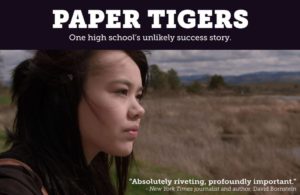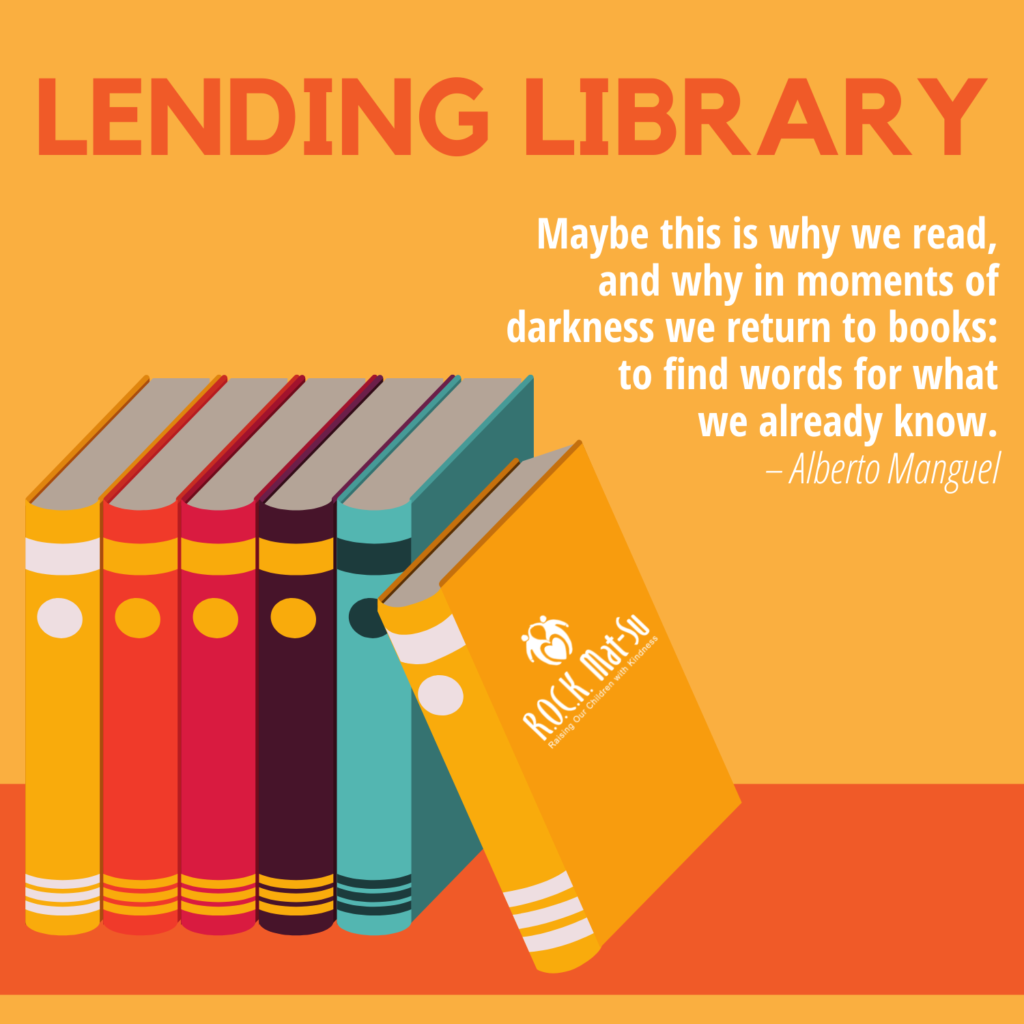
Book and Video Lending Library
R.O.C.K. Mat-Su's book and video library is accessible to partners! The collection focuses on topics associated with the collective’s vision to end child maltreatment and promote family resilience. Books and media focus on adverse childhood resilience, community organizing, healing from child sexual abuse, parenting, partnerships, racial equity, resilience, trauma, and trauma-sensitive education. The online catalog that will allow you to search for books and media, place holds, check out, and read/write reviews on all our books and videos!
FAQs
To set up a patron account, click here to send an email to the administrator. Follow-up instructions will be emailed to you.
- Visit the library in the R.O.C.K. Mat-Su Clubhouse.
- Make your selections and then open libib.com/u/rockmatsu on provided tablet or your computer or smart phone. Open the book or media description and click “hold”. Staff will change your “hold” status to “checked out” status.
- When you’ve completed making selections, click “complete” in the lower right corner. That’s it!
- Visit libib.com/u/rockmatsu to access the library. Open the book or media description and click “hold”.
- When you’ve completed making selections, click “complete” in the lower right corner. This will prompt staff to remove your selections from the shelves.
- Books and media will be left with the Mat-Su Health Foundation security desk (1st floor, 777 N Crusey St., Wasilla). Stop by during business hours and simply provide your name. Staff will change your “hold” status to “checked out” status.
- Pick-Up Location:
-
- Book Location: Security Desk, A101 | Mat-Su Health Foundation (MSHF) | 1st Floor
- Address: 777 N. Crusey St., Wasilla AK 99654
- Building Hours: 8:00 – 5:00 PM | M – F
- Your Book: A copy of the book(s) you requested will have a post-it note with your name
Add content.
Books can be returned directly to a R.O.C.K. Mat-Su staff member or to the Mat-Su Health Foundation security desk (1st floor, 777 N. Crusey St., Wasilla) during business hours (8:00 am – 5:00 pm, Monday through Friday).
Book Club Sets Available
R.O.C.K. Mat-Su has 10 copies of each of the books visible below ready for your next book club read.
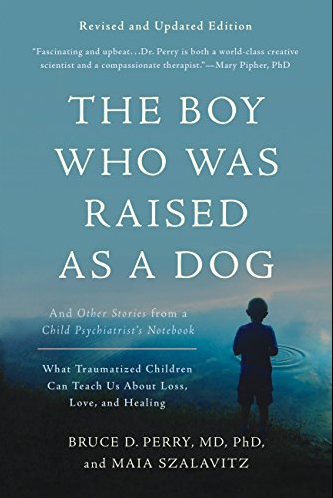
How does trauma affect a child’s mind – and how can that mind recover? In the classic The Boy Who Was Raised as a Dog, Dr. Perry explains what happens to the brains of children exposed to extreme stress and shares their lessons of courage, humanity, and hope. Only when we understand the science of the mind and the power of love and nurturing can we hope to heal the spirit of even the most wounded child.
Source: Reading Between the Wines
-
What does it mean to be empathetic to one another? Why is that important?
-
Is empathy something you turn on and off depending on who you are interacting with or in what context you are interacting?
-
Are doctors who often have to separate their emotions from the situation at hand (e.g. performing heart surgery on a child patient) exhibiting empathy? How does empathy play a role in the doctor-patient relationship?
-
How much of an effect will our increased reliance on the Internet / social media to connect with others also impact our children’s children’s biological development?
-
If psychiatrists or journalists watch or report on people suffering, should they intervene? (i.e. Kevin Carter and “Starving Child and Vulture”)
-
Where does the boundary lie between helping people resolve their issues versus taking care of them?
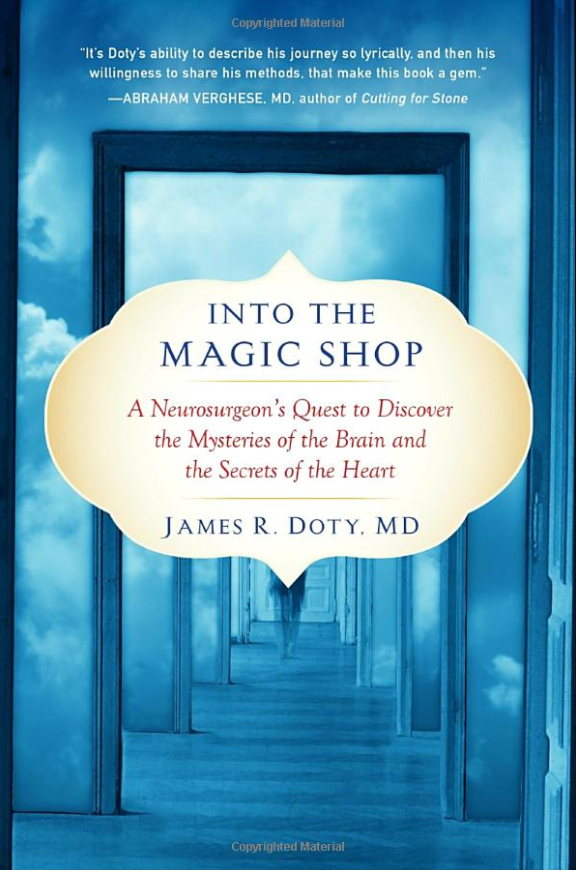
Growing up in the high desert of California, Jim Doty was poor, with an alcoholic father and a mother chronically depressed and paralyzed by a stroke. Today he is the director of the Center for Compassion and Altruism Research and Education (CCARE) at Stanford University, of which the Dalai Lama is a founding benefactor. But back then his life was at a dead end until at twelve he wandered into a magic shop looking for a plastic thumb. Instead he met Ruth, a woman who taught him a series of exercises to ease his own suffering and manifest his greatest desires. Her final mandate was that he keep his heart open and teach these techniques to others. She gave him his first glimpse of the unique relationship between the brain and the heart.
Doty would go on to put Ruth’s practices to work with extraordinary results—power and wealth that he could only imagine as a twelve-year-old, riding his orange Sting-Ray bike. But he neglects Ruth’s most important lesson, to keep his heart open, with disastrous results—until he has the opportunity to make a spectacular charitable contribution that will virtually ruin him. Part memoir, part science, part inspiration, and part practical instruction, Into the Magic Shop shows us how we can fundamentally change our lives by first changing our brains and our hearts.
Source: Super Summary
Discuss the figurative and literal significance of the work’s title. What is “the magic shop” to Doty?
Although Doty provides readers with instructions on how to relax the body, clear the mind, etc., the majority of the book takes the form of a memoir. Why might Doty have chosen this genre to communicate Ruth’s teachings?
How does Doty characterize his childhood in Lancaster? In what ways do his experiences there shape his life going forward?
What initially attracts Doty to medicine? How does his understanding of what it means to be a doctor change over the course of the book?
Discuss the different theories regarding near death experiences that Doty explores. Why does Doty ultimately reject the need to “explain” his own NDE in these terms?
What is neuroplasticity? In what ways does it explain the ability of techniques like visualization to effect real world change?
Choose one of the anecdotes involving Doty’s patients. How does it contribute to the overall meaning of the work?
Although Ruth is clearly a central figure in Doty’s life, he knows relatively little about her life and circumstances; as a boy, in fact, he sees her as an almost “supernatural being” (60).
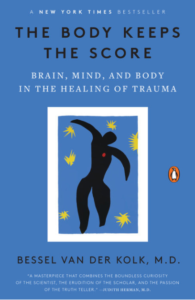
Trauma is a fact of life. Veterans and their families deal with the painful aftermath of combat; one in five Americans has been molested; one in four grew up with alcoholics; one in three couples have engaged in physical violence. Dr. Bessel van der Kolk, one of the world’s foremost experts on trauma, has spent over three decades working with survivors. In The Body Keeps the Score, he uses recent scientific advances to show how trauma literally reshapes both body and brain, compromising sufferers’ capacities for pleasure, engagement, self-control, and trust. He explores innovative treatments—from neurofeedback and meditation to sports, drama, and yoga—that offer new paths to recovery by activating the brain’s natural neuroplasticity. Based on Dr. van der Kolk’s own research and that of other leading specialists, The Body Keeps the Score exposes the tremendous power of our relationships both to hurt and to heal—and offers new hope for reclaiming lives.
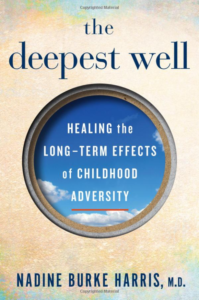
Dr. Nadine Burke Harris was already known as a crusading physician delivering targeted care to vulnerable children. But it was Diego—a boy who had stopped growing after a sexual assault—who galvanized her journey to uncover the connections between toxic stress and lifelong illnesses.
The stunning news of Burke Harris’s research is just how deeply our bodies can be imprinted by ACEs—adverse childhood experiences like abuse, neglect, parental addiction, mental illness, and divorce. Childhood adversity changes our biological systems, and lasts a lifetime. For anyone who has faced a difficult childhood, or who cares about the millions of children who do, the fascinating scientific insight and innovative, acclaimed health interventions in The Deepest Well represent vitally important hope for preventing lifelong illness for those we love and for generations to come?
Source: Lead to Healing
Chapter by chapter questions available at Lead to Healing.
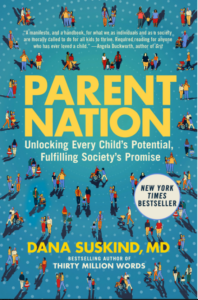
World-class pediatric surgeon, social scientist, and best-selling author, Dr. Dana Suskind returns with a revelatory new look at the neuroscience of early childhood development—and how it can guide us toward a future in which every child has the opportunity to fulfill their potential.
Her prescription for this more prosperous and equitable future, as clear as it is powerful, is more robust support for parents during the most critical years of their children’s development. In her poignant new book, Parent Nation, written with award-winning science writer Lydia Denworth, Dr. Suskind helps parents recognize both their collective identity and their formidable power as custodians of our next generation.
Weaving together the latest science on the developing brain with heart-breaking and relatable stories of families from all walks of life, Dr. Suskind shows that the status quo—scores of parents convinced they should be able to shoulder the enormous responsibility of early childhood care and education on their own—is not only unsustainable, but deeply detrimental to the wellbeing of children, families, and society.
Anyone looking for a blueprint for how to build a brighter future for our children will find one in Parent Nation. Informed by the science of foundational brain development as well as history, political science, and the lived experiences of families around the country, this book clearly outlines how society can and should help families meet the developmental needs of their children. Only then can we ensure that all children are able to enjoy the promise of their potential.
Film Recomendations Available to Rent
R.O.C.K. Mat-Su the following films available for individuals and groups to borrow.
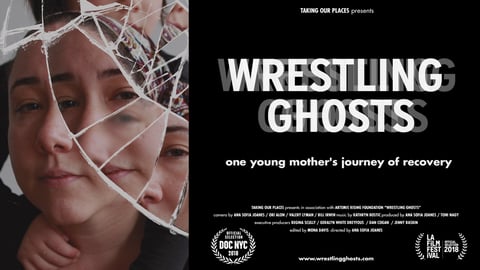
TRIGGER WARNING: This documentary discusses multiple forms of trauma, including intergenerational trauma, sexual assault, and mental health.
This film is not appropriated for children.
Directed By: Ana Joanes
Language: English
92 Minutes
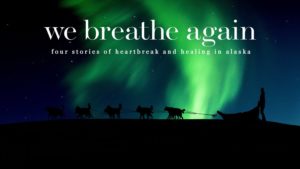
Producers: Evon Peter & Enei Begaye Peter
Production Company: Crawl Walk Run, Native Movement & University of Alaska Fairbanks
The traumatic impacts of colonization and practices of forced assimilation affect generations of Alaska Native people. The associated social outcomes include formidable inter-generational challenges, such as substance abuse, sexual abuse and suicide. The legacy of this recent history and inter-generational trauma is complex and rarely discussed.
57 minutes
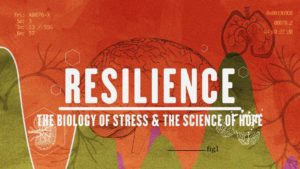
– Laura Porter, Co-Founder, ACE Interface
individuals who looked at the ACEs research and the emerging science of Toxic Stress and asked, Why are we waiting? Each took this new information and used it in new ways. Dr. Nadine Burke Harris, a pediatrician in San Francisco, intervenes early with her young patients who are at greater risk for diabetes and asthma as well as learning and behavior problems now. In New Haven, Connecticut, we meet Alice Forrester and Laura Lawrence of The Clifford Beers Clinic, which provides mental health services for children by including the entire family in their programs. In an elementary school across town, kindergarteners recite “Miss Kendra’s List”—a bill of rights for children—and learn ways of expressing and coping with their stress. In the great Northwest, communities across the state of Washington brought together teachers, police officers, social service workers, and government officials to learn about the brain science of adversity. Since implementing “trauma-informed” policies and practices, these communities have seen drastic reductions in rates of everything from dropping out of high school to teen pregnancy, and youth suicide domestic violence.
60 Minutes
